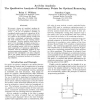Free Online Productivity Tools
i2Speak
i2Symbol
i2OCR
iTex2Img
iWeb2Print
iWeb2Shot
i2Type
iPdf2Split
iPdf2Merge
i2Bopomofo
i2Arabic
i2Style
i2Image
i2PDF
iLatex2Rtf
Sci2ools
140
Voted
AAAI
1994
1994
Activity Analysis: The Qualitative Analysis of Stationary Points for Optimal Reasoning
We present a theory of a modeler's problem decomposition skills in the context of optimal reasonzng -- the use of qualitative modeling to strategically guide numerical explorations of objective space. Our technique, called activity analysis, applies to the pervasive family of linear and non-linear, constrained optimization problems, and easily integrates with any existing numerical approach. Activity analysis draws from the power of two seemingly divergent perspectives -the global conflict-based approaches of combinatorial satisficing search, and the local gradientbased approaches of continuous optimization -combined with the underlying insights of engineering moriotonicity analysis. The result is an approach that strategically cuts away subspaces that it can quickly rule out as suboptimal, and then guides thenumerical methods to the remaining subspaces.
AAAI 1994 | Activity Analysis | Constrained Optimization Problems | Intelligent Agents | Modeler's Problem Decomposition |
| Added | 02 Nov 2010 |
| Updated | 02 Nov 2010 |
| Type | Conference |
| Year | 1994 |
| Where | AAAI |
| Authors | Brian C. Williams, Jonathan Cagan |
Comments (0)

